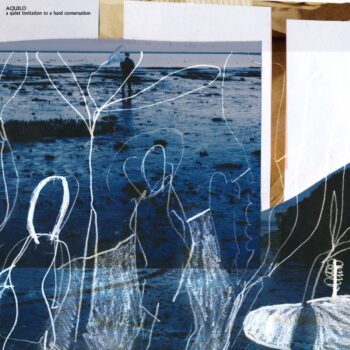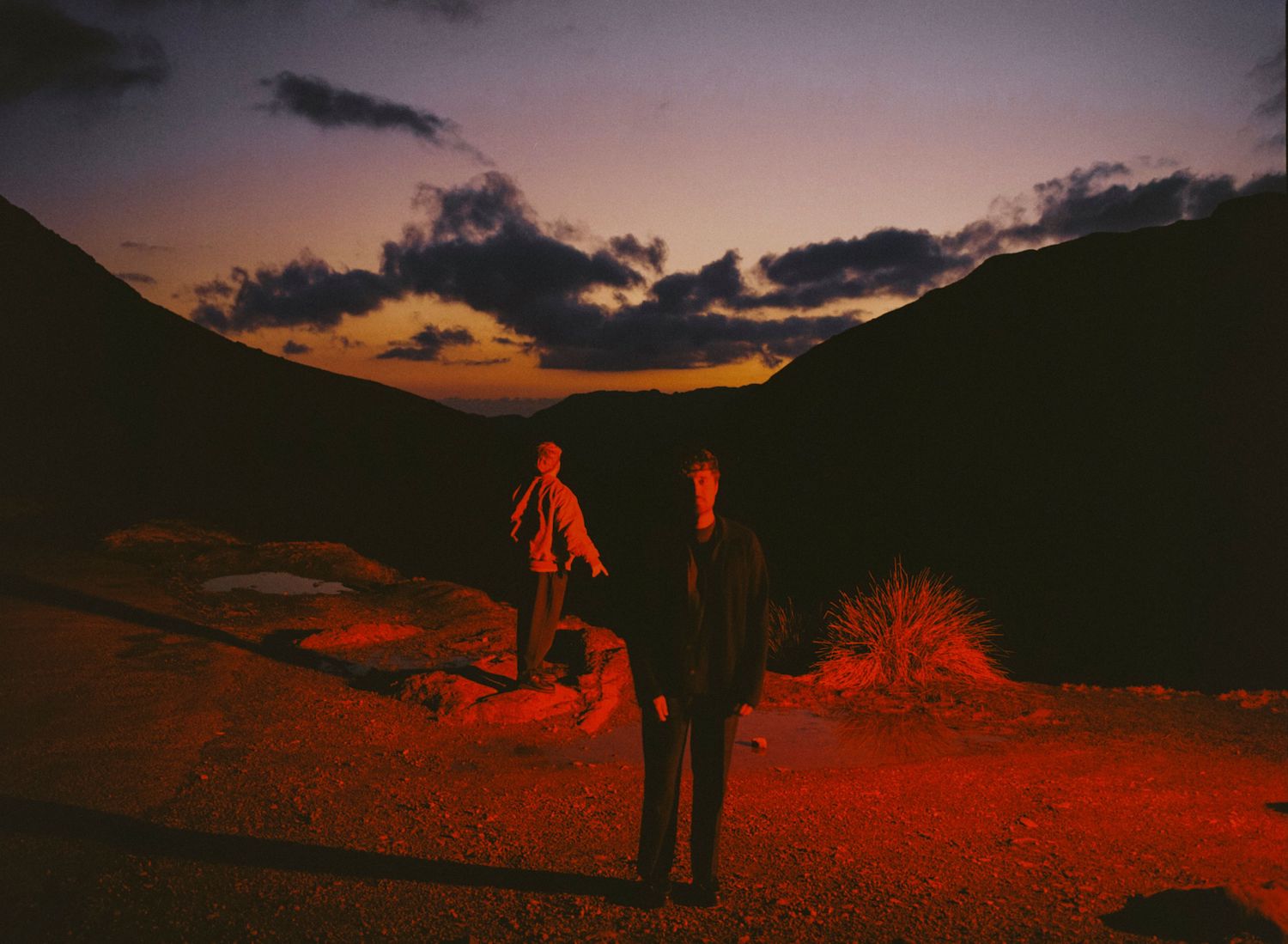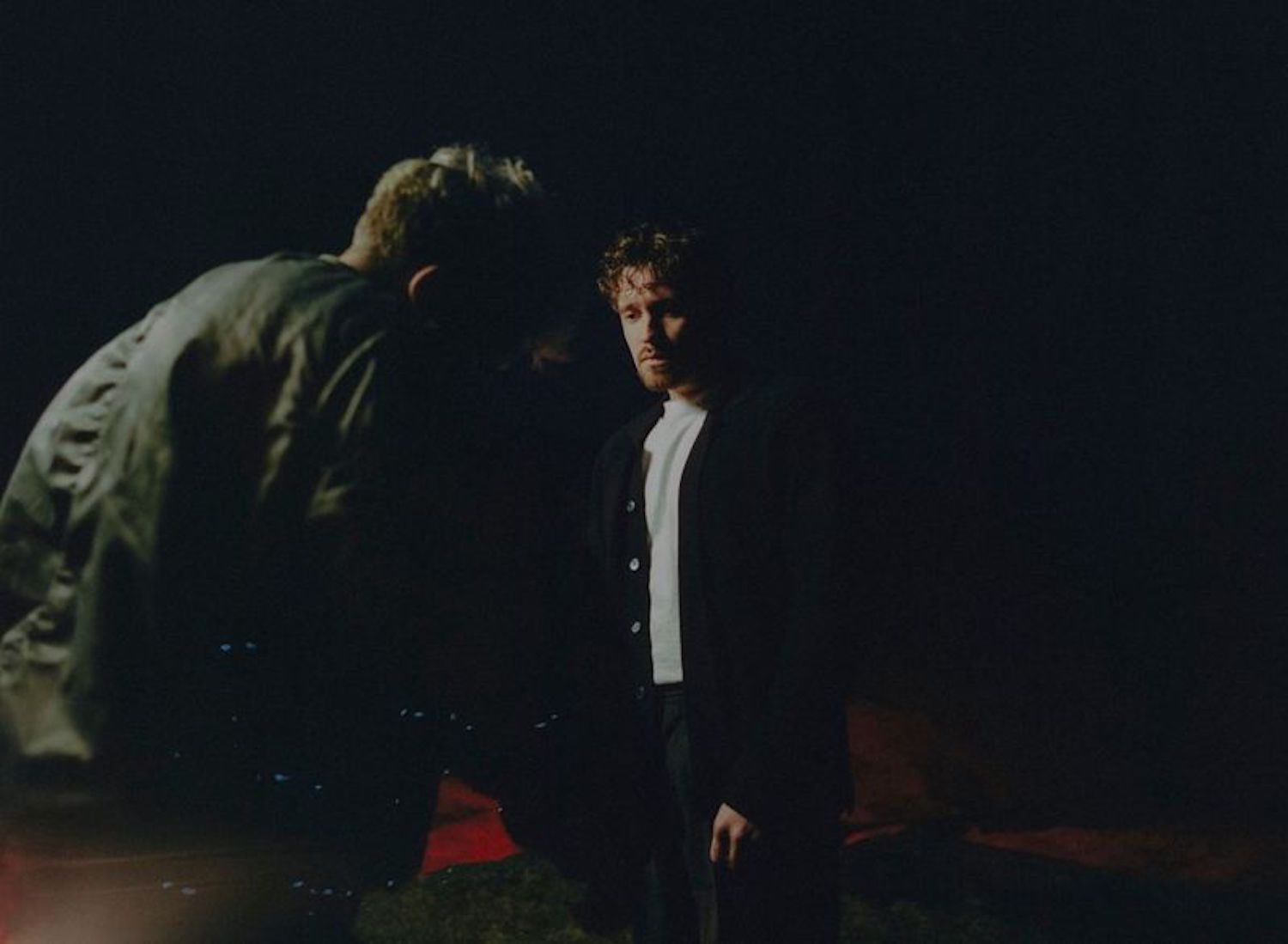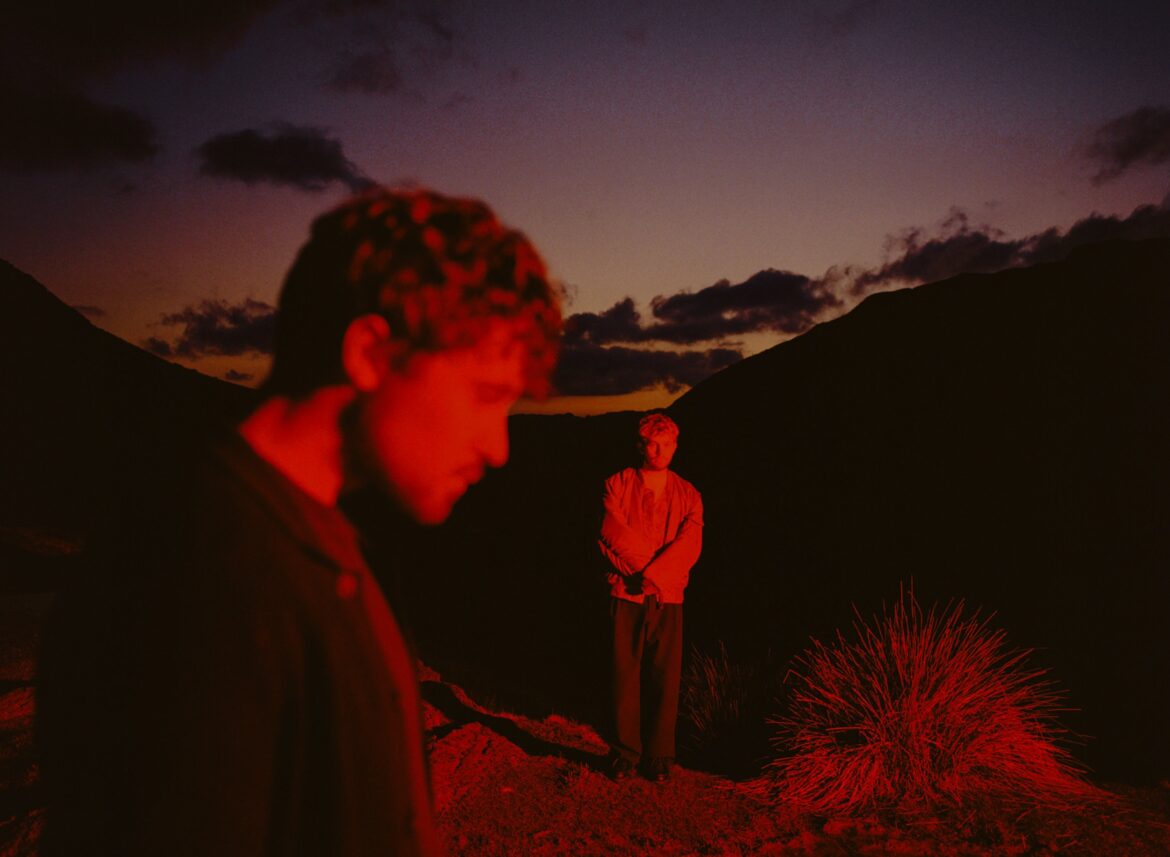Aquilo’s Tom Higham and Ben Fletcher dive into the intimate depths of their soul-stirring fourth album ‘A Quiet Invitation to a Hard Conversation,’ a breathtakingly beautiful, emotionally charged collection of songs that ache from the inside out while finding a light in the darkness.
Stream: ‘A Quiet Invitation to a Hard Conversation’ – Aquilo
We won’t exist in a world where we’re making singles. We just won’t do that. We may be the last people making albums; we’ll be old boys, together.
Aquilo’s Tom Higham and Ben Fletcher are all smiles these days – and for very good reasons.
With the release of their fourth studio album, the British musical duo are finally able to share – with friends, with family, and with the whole wide world – a body of new music they proudly (and unapologetically) call their “best work yet.” A tender tempest of soul-stirring sound, A Quiet Invitation to a Hard Conversation is breathtakingly beautiful and cinematically stunning: An emotionally charged collection of songs that ache from the inside out, hurting so good in a way that only an Aquilo album can.
Likening it to a letter to their younger selves, Higham and Fletcher call their new album a timestamp of the past three years (their last LP, A Safe Place to Be, released in 2021), its songs exploring and unpacking personal moments that happened to themselves and to friends. For those at home listening, A Quiet Invitation to a Hard Conversation offers itself as a comforting blanket of intimate connection, tenderness, and hope: It’s an unflinchingly honest, and ultimately uplifting musical tapestry navigating life’s lows and finding that all-too elusive (but still ever-present) light in the darkness.

I think you need a painkiller
‘Cause you been sleeping with the lights on
Takeaway the pain quicker
And all that shit you’re tryna run from
I don’t really know about you
I hate to see you black and blue
I could be your painkiller
Time will slowly unfold you
Even though they told you
nothing would work
You’ve been in the deep-end
Without your best friend
Man I know it hurts
– “Painkiller,” Aquilo
And the very best part of this whole endeavor? Aquilo, now in their tenth year, are still just getting started. Released August 9th, 2024 via AWAL Recordings, A Quiet Invitation to a Hard Conversation is part one of two; its sister album (Aquilo’s fifth LP), You Should Get Some Sleep, is set to release on December 6th. Both records were made at the same time and in the same studio with executive producer Elliot James, and they will be grouped together as a double LP at year’s end.
“We don’t really have a glamorous explanation for it; it just happened!” Ben Fletcher says, a twinkle in his eye. “There’s no way that any of these songs could have got cut off. We got so attached to them, that they all had to get used – and they’re good; they’re really good.”

Aquilo have always put their hearts and souls into their songs, and this time around was no different.
A Quiet Invitation to a Hard Conversation‘s music is as vulnerable as it gets, the band’s lyrics and vocal performances a moving tapestry of cathartic upheavals, candid confessionals, and gut-wrenching inner reckonings.
The big change for Aquilo was Elliot James on as their one and only producer. His presence behind the board freed them up to focus on songwriting and other creative elements, from finding the right voicings to experimenting with sounds and textures and the like.
“His instincts are just absolutely bob-on, and his sonics are so on our level,” Tom Higham says. “We knew instantly when we had a first session with Elliot that we wanted him to produce a record with us.”
“I think this new stuff, there’s a delicate kind of intricacy to it all,” Fletcher says of the end result. “It’s very airy. The sonic palette feels more mature. It feels bit more tasteful. For Tom and me, there’s nothing on this A Quiet Invitation to a Hard Conversation and You Should Get Some Sleep, instrumentation-wise, there that shouldn’t be there. It’s quite well thought out, but it’s not overthought, and that’s the thing. It’s simple, but it’s well thought out and there’s nothing there that doesn’t need to be there.”
“And that was something that I loved about having Elliot there for, because he’d take things away that we really wanted there and he was like, ‘don’t need it.’ He was like, ‘just live with it. Take it away, take it away.’ And you take it away and you’re like, ‘Oh yeah, the song still works.'”
Ever wonder why we’re in the same old place
With the same old faces
And we just get wasted
Lately you’ve been running up the same old hills
All the awkward phases
You’re coming down in stages
By design we lose our minds
Even if the world don’t understand you
I do, I do
– “Even If the World Don’t Understand You,” Aquilo

A Quiet Invitation to a Hard Conversation warms the heart and feeds the soul with songs that soothe, stir, and soar.
From the spellbinding, brutally raw opening moments of “Painkiller” – a song first written five years ago with Holly Humberstone – to the haunting final moments of “Even If the World Don’t Understand You” and the enchanting instrumental “Want You to Want It (Reprise),” Aquilo’s new record breathes with unfiltered heat and earnest charm.
Atwood Magazine recently caught up with Tom Higham and Ben Fletcher for an in-depth conversation about Aquilo’s captivating fourth album: Dive into A Quiet Invitation to a Hard Conversation in our interview below as we discuss the band’s boldest body of work, their takeaways after a decade in the music industry, and much more!
— —
:: stream/purchase A Quiet Invitation to a Hard Conversation here ::
:: connect with Aquilo here ::
Stream: “Painkiller” – Aquilo
AN (EASY) CONVERSATION WITH AQUILO

Atwood Magazine: Tom, Ben, we're talking on your album’s release day – congratulations! How does it feel to have Aquilo’s fourth record out and in the world?
Tom Higham: I say, it’s fourth record, isn’t it? I forget that… That’s a lot. We’ve done a lot of records. It feels good; feels really good!
Ben Fletcher: It’s, yeah, it’s a weird feeling. I think we should probably start this. So, Mitch, we haven’t told anyone other than the people in our team know this, but so today we’ve released A Quiet Invitation to a Hard Conversation. It’s only the first half, and it’s actually a full double album. And on Monday, we’ll announce the second album, which is called You Should Get Some Sleep. It was all recorded at the same time in the same studio, and it’s a full double album. We haven’t told anyone this, so you can be the first person to talk about it!
Tom Higham: We’ve been doing this for so long though. We’ve been making this for so long. It’s exciting.
Ben Fletcher: It is mad how long we have been making music together for long though; it’s crazy. I saw a friend not too long ago who was like, “Are you still making music?” And I was like, “Yeah, I’m still making music.” He is like, “What? With Tom?” He was like, “Are you not sick of each other?” [laughs] It just works! I don’t know why, it just works.
Tom Higham: That’s why I make music.
This release marks 10 years for Aquilo; your debut EP released in 2014! A decade in, what are your takeaways from your career thus far in the music industry, and what are you most proud of in terms of what you've been able to accomplish over that time?
Ben Fletcher: Good question. Tom, you did a post on your Instagram today, which you summed it up quite well. You said, said something along the lines of, the ups and downs of this whole game, this whole thing is no joke. There are massive highs and there are some big lows. I think sometimes we do scratch our heads and wonder why. You do wonder why you do it, especially when it becomes a job… When you are a kid, when we first started out, the thought of it ever being a job is out of reach. So you’re just doing it for fun. That’s why everyone started doing it because it’s just like, just creating stuff.
It’s just making music. And then when it becomes a job, I think, yeah, we do sometimes scratch our heads and wonder why we’re doing it. And every time we get to that moment of an album, when the album comes out, you look back at what you just made and you’re like, f*ing hell. We went through some sh*t to make that, and you do go through so much self-doubt, and I think we both play specific roles in our relationship in pushing each other through it. I think if we were a solo artist, we might not have made four albums and have a fifth on the way. I think we may have stopped a while ago.
I think we’ve been really lucky that we’ve been lucky to have certain people around us that have been really supportive and good to us, and yeah, we just have been lucky. You hear all these horror stories of bands getting screwed over by the major and blah, blah, blah. Yeah, it happens. But I don’t know, we’ve been surrounded by good people and what will be, will be, kind of thing. I just was amazed that we’re still able to just keep doing it. Also, I think we’re getting better at it. I still feel like we’re trying to perfect our craft. Does that make sense?
Tom Higham: Well, you’re constantly learning, aren’t you? That’s something that I’ve definitely taken away from it.
Ben Fletcher: Yeah, for sure. And we work with other artists on their music and we’re constantly learning. It’s like this pot of gold that you just keep chasing that’s never there, and that’s just the process: You’re just learning and you’re doing it because it’s what you do, until it’s not viable anymore, and cool. We might be one of those bands that has 20 albums with no greatest hits. [laughs]
Tom Higham: That what makes it worth it though, isn’t it? When you do get those songs that you write that do make it onto the album, do see the light of day. ‘Cause Ben and I write so many songs. Over the past three years of making this album, we have written so many songs that are never gonna see the light of day. There’s literally just hard drives full of tunes, hundreds of tunes that we have just either started and not finished. And little ideas, the logic sessions here and there that if we revisited, we might find that we absolutely love them and in like a year or something, we probably won’t. So when you do get that moment, when you do write a song and you’re like this is gonna see the light of day, it does make it worth it. Sure.
Ben Fletcher: We’ve got new management now and we just sent them loads of songs. We’ve been working with them for a bit and we just sent them loads of… They were like, can you just send us some tunes? We just send them some songs. And before we knew it, we were getting sync requests for TV shows in America, like Grey’s Anatomy and Virgin River and things like that. It’s blatantly me and Tom, but it didn’t quite fit the message or the headspace that we were in, so we’ve made this side project, which is basically, it’s Aquilo, but songs getting used for TV and film, but it’s not Aquilo, if that makes sense. It’s weird, but that’s the thing that we’ve ended up doing where, and it’s quite a freeing thing ’cause now we make music without thinking that anyone’s gonna ever have to know it’s us. And that’s a really nice feeling ’cause we put ourselves in a box sometimes, and that’s not helpful.
Tom Higham: It’s called LA5, it’s just on Spotify.
Ben Fletcher: Go and have a nosy.
Tom Higham: It sounds like unfinished work because the turnaround is so quick on those sync requests. You do day one in the studio and we do it in Nashville or something, and then we come home and then they request a sync and they love the song. And then we go, okay, we’ll approve it. And then the producers just send the day one demo out, and then that’s what gets used. And that’s what gets… It’s still… It’s actually an incredible way of working, but not the way that we normally work. We normally just become quite obsessed with the process of mixing or mastering and we take a lot of time with the music that we put out as Aquilo, but these sort of LA5 things do feel a bit like it’s very fast-paced. I can’t like that, it’s just a different way of working.

Is there anything you wish you could go back and tell yourselves when you were first starting out with what you know now?
Tom Higham: Yeah, I would tell my younger self not to worry as much and try and enjoy it a little bit more ’cause I just used to worry when I was… When I was starting this, I was constantly worried. And it’s just so time consuming and it doesn’t make any sense. And just to actually try and enjoy the moments and that’s what I was touching before. Just managing your expectations and actually trying to live more, it sounds so cheesy, but live more in the moment and just sort of be like, try… Enjoy being happy. Do you know what I mean? Instead of worrying what’s around the corner. I wish I’d told myself that because I was chronically worried when I was a kid. I say when I was a kid, I was 23 when we started this. But that still feels like a kid. [laughs]
Ben Fletcher: You didn’t become an adult until you turned 30. Did you?
Tom Higham: Yeah, I don’t think I’m an adult yet. I’m getting there though.
Tom, you said the biggest thing that you would tell your younger self was not to worry so much. Do you feel like you're living by those words at this point with this record?
Tom Higham: Yeah, 100%. It took me a long time to realize that just, I don’t know, just to take it a little bit slower, take it a bit easier, maybe just growing up. But I definitely worry less now. I don’t have the energy for, I really can’t be bothered. Maybe that’s a bad thing. But I’m happy. Maybe it’s not. [laughs]
Don't worry, be happy! You guys have now been independent for as long as you were signed to a major.
Tom Higham: Oh, what the f**, today, this is good!
You've clearly found your footing in a world that scares so many people. What’s it like running your own operation like that? What's that experience like, from your point of view?
Ben Fletcher: When I look back, I do feel when we were at Island Records, there was that pressure to make a hit. And obviously we all know you can’t just make a hit, but that’ll kind of linger in your mind that it’s to compete at a major and you… There’s a game that has to be played. But, we haven’t, on the last album and this that definitely this album and the next one there’s definitely not a hit, we know that and we’re comfortable with that if a certain song does well then great, but no maybe we just, we’re kind of having more, like Tom said, taking it slower and we’re just kind of doing it and we’re not thinking tactically about any and there’s no tactics, basically. [laughs]
A lot of the people who work on our projects, who work with us, do it because they love it. We all feel we’re part of something great. And it’s exciting ’cause we’re having fun and we’re just trying things out, and yeah it’s a little bit different. I wouldn’t say it’s massively different, but for me, that’s one of the big things – we don’t care about the charts. I have zero interest in the charts, and hats off to people that do and do well; that’s great. I think that’s just a different beast. We’re just not there, and I don’t really have a drive that I used to.
I can remember when we were Island Records, everything was about getting in the charts, and I don’t know; that’s just not us anymore. Just not interested in it at all. And it also means that you can mix just the way that it all is now with Spotify and all this short form content stuff, the weirdest of songs are popping off. There’s no specific way of making a song anymore. There’s a number of things that could happen to make a song have a moment, and it’s kind of a beautiful thing. Us not being on a major where we’re now just making music that we like making. And if something happens, something happens.
No one's saying, “We need another ‘Silhouette.’”
Ben Fletcher: We could never make another “Silhouette” – we could just never do that.
Tom Higham: We’ve already done that!

This brings us to your fourth studio album! What is the story behind A Quiet Invitation to a Hard Conversation?
Ben Fletcher: That’s a very good question. That album title came very late in the process, when we’d written “Want You to Want It” in Nashville. We struggled to work out exactly what these songs are about, ’cause we’d been working on it for about three years. And what makes A Quiet Invitation to a Hard Conversation a special one to us is a real mixture of things and subjects. It’s not a breakup album; there’s no specifics there. It’s really quite general – it’s about friends, it’s about personal things Tom and I have been through. I guess you could kind of call it a timestamp in a way over these three years.
A friend of ours, she’s actually our publisher, she was saying it kind of sounds like a letter to our younger selves. And there’s some things in there that I could have done with hearing when I was younger, and I think Tom, you as well would probably resonate with that. So between each other, to each other, we’ve been calling it. We haven’t told anyone this, calling it this at all, but we had a chat about it the other day; maybe it is just a letter to our younger selves.
Tom Higham: I also feel that within those three years, we’ve done a lot of growing up and we were struggling to really find out what we wanted to write about. We’ve been writing obviously throughout that three year process, but the songs themselves really how came in quite quick succession – like, over the last year we did a trip over to Nashville and sort of fell in love with Nashville, and we found a load of incredible collaborators out there that we work with sometimes in England. But being in a different place, we just came up with so many different things and we were like, okay, well let’s just strike whilst the iron’s hot, we ended up writing a bunch of tunes. I feel like the two albums came together really quickly and one of the reasons why we’re doing two albums is because we wrote so many songs that we were like we can’t put all these songs in one album, but let’s split it into two. And that is one of the reasons why we did it. So that’s kind of the story of it.
Ben Fletcher: Yeah, those two albums, like Tom said, it all came very quickly. The reason they’re split into two, but once you listen to the second album, it would make sense why they are split into two – slightly different feelings. It just kind of sits nicer, separated that way. There’s lots of references in the first to the second. We’ve been describing it as a sister album. You Should Get Some Sleep is A Quiet Invitation’s sister. I think it would make more sense to listen to the two of them. And of course they’re all produced and recorded and written pretty much at the same time. So it sits as a body of work anyway. We’d worked with producers on other things, but we’ve never had an exact producer from start to finish of the recording.
Tom Higham: And one last studio as well, which I absolutely loved.
Ben Fletcher: Yeah. It’s always been quite bitty, and that’s not a problem. But I think on Silhouettes we did some stuff with Ólafur Arnalds, and then we did stuff with SOHN, and then a few of our friends chipped in, and we do a lot of it. It took us four or five years to make, and we listened to some of those songs, we were like, ‘That song maybe shouldn’t be in the album. It doesn’t sound like it sits there.’ And then… I’m trying to think. We produced the second album and the third one. And we’d always wanted to just have one person oversee our scatty brains –
Tom Higham: – and also bring different sonics into it as well! If we did another album, it would just end up sounding, well, not necessarily just like the rest of them, but it’s nice to have someone else, especially Elliot James (the executive producer on both records), because Elliot’s just got such good instincts with it all.
Ben Fletcher: And that’s obviously where we should probably bring in Elliot. So we met Elliot one of our good friends, John Green, who we write lot of our music with John made, I don’t know if you know this, but they kind of have like a… They go way back, they go back like 20 something years and they’ve made music together for a long time. And John made this band called Reunion in lockdown. And we heard this song and we were like, f*ing hell, that is unreal. Then that’s when we were like, who’s the other guy that, who’s the other guy? And then that’s how we met Elliot. And yeah. And then we met Elliot, started making music and Elliot has produced some things that, like when we were teenagers we were like mildly obsessed with. So it’s been, yeah, it’s been really nice to have those two involved in a way and work on it together from afar. Obviously John lives in Nashville now, but they spent a lot of time on the phone talking songs and, it’s just been really nice kind of having those two involved. But yeah, Elliot smashed it and we owe him a lot for joining us for two albums. Yeah.
When we write songs, we kind of produce them as we go. But this is the first we’d ever taken songs to someone and then we literally flew from Nashville with these songs, and we were playing him the songs, and we just recorded everything… I guess that’s why it all sounds so cohesive as a body of work. It’s all been rerecorded!
Is it freeing to hand that job over to someone else and just focus on the instruments, on singing, and songwriting?
Tom Higham: Absolutely! There’s a lot of trust that goes in it though. And Elliot’s been doing this for a while now. Like I said before, his instincts are just absolutely bob-on, and his sonics are so on our level. We knew instantly when we had a first session with Elliot that we wanted him to produce, or to do something with us. We came back and it was really weird; It was a really weird song, but it sounded sick. We used to listen to it all the time. The sonics of it were just incredible. Classic and classy, and that’s why we trusted him. I fell asleep loads of times. It was just so chill.
Ben Fletcher: I have so many videos of Tom asleep in the studio! [laughs]
Tom Higham: I don’t know what to do with myself when I’m not producing.
How does this new record compare to A Safe Place to Be for you? How do you feel you've grown over the past three years and all that?
Tom Higham: I would say that they’re two totally, totally different things. The fact that, well we wrote a lot of them and produced it in like, my kitchen in Camberwell and remember this was in like peak lockdown. It was just a totally different, we just wanted to make a record. That’s what we do. We make records. I don’t even know how to compare it, ’cause you just can’t. This is, we’ve done this so differently than ‘A Safe Place to Be’ And nothing against ‘A Safe Place to Be’, but I definitely feel a lot more for the new music, maybe because I haven’t lived with it for as long. I might [chuckle] might hate it in a week, but yeah. What do you think, Ben?
Ben Fletcher: Yeah, I agree. I think they’re two completely different things. I actually think part of me… [laughs] If I could go back and redo A Safe Place to Be, I would just have Elliot involved.
I think this new stuff, there’s a delicate kind of intricacy to it all. It’s very airy. The sonic palette feels more mature. It feels bit more tasteful. For Tom and me, there’s nothing on this A Quiet Invitation to a Hard Conversation and You Should Get Some Sleep, instrumentation-wise, there that shouldn’t be there. It’s quite well thought out, but it’s not overthought, and that’s the thing. It’s simple, but it’s well thought out and there’s nothing there that doesn’t need to be there.
And that was something that I kind of I loved about having Elliot there for, ’cause he’d take things away we really wanted there and he was like, don’t need it. He was like, just live with it. Take it away. Take it away. And you take it away and you’re like, oh yeah, the song still works. And he’s like, actually, it’s clearer now. I would just say that the new stuff is more mature than A Safe Place to Be. It’s kind of hard for us.
You staged a ‘comeback’ earlier this year with “Painkiller” and “Keep Moving,” which I thought were a great best foot forward. Why did you choose those two songs as the foundational building blocks for this record?
Ben Fletcher: Good question! “Painkiller” we wrote years ago, we actually wrote “Painkiller” probably just after we’d written the second album. And we wrote that with Holly Humberstone. And we actually wrote that for Holly’s album. And it’s funny, she loved the song and we loved the song and we always thought she was gonna use it, and we’d always come back to it. We’ve worked with lots of other artists, but this particular song, “Painkiller,” we really liked it. It felt like it had a real gravity to it. And we kept asking if she was going to use it, and eventually we got to a point where we were like, it’s chill if you don’t use it, but if you don’t use it, we’re gonna use it.
And she was like, “Okay, cool. You just use it.” Okay, great. Perfect. So then we went away and we made so many different versions of it, like so many different versions, and time moved on… We went to Nashville, blah, blah, blah, blah, blah. Taking songs to Elliot at this point. “Painkiller” was quite process where we were like, oh, you should have a go at doing “Painkiller” with us. Elliot kind of ripped to shreds the production that we’d done on “Painkiller” and literally started again. It’s never happened that you have so many versions of the song. The song’s never gonna get done; if you have loads of versions of a song, you’ve kind of lost the battle. But we painted it weirdly, when we did it with Elliot, we were like oh my god we’ve gotta make “Painkiller” but it actually fits what we’re doing even though we wrote it like four, five… How long ago have we written “Painkiller”? Five years ago maybe?
And we wrote “Keep Moving” with John Green. Both of them were done very, very close to each other, if I remember correctly. They were done very close to each other, and they just sat and existed together for quite a while. So we always kind of saw them together.
Tom Higham: I think “Keep Moving” is one of those songs as well that it wasn’t a single, not like “Painkiller” was. So we thought we might as well just put two out, because then at least “Keep Moving” gets a bit of a look in as well. It’s a really special tune for us. We really love that song, but it’s not a single.
Ben Fletcher: If we hadn’t released “Keep Moving” with “Painkiller,” “Keep Moving” would just sit on the album. All of our friends say “who listens to the albums anymore?” But we do – we just went and made two of them. [laughs]
What do you think it is about “Painkiller” that you couldn't let go of? You’ve told me yourselves, you must have written 300 songs over the past couple of years. Why couldn't you let go of this one?
Ben Fletcher: Again, it’s a great question. For me it was every, I’d say once a week, I’d be like, I’d be doing something really mundane and in my head I would just have, da da da, it would just linger in my brain. I think that’s kind of it. I think I’d always be going ‘painkiller.’ Whenever my girlfriend has a headache, she goes, “I think I need a painkiller.” And that went on for years.
But in all seriousness, I’m not sure. It’s just a good song, and there’s nothing worse than knowing you’ve written a good song that will never see the light of day. It’s really, really hard to write good songs. Like, really, really hard. I know sometimes people write good songs and don’t realize they’ve written good songs. But it’s really rare that you write a song and go, “That’s really great.” And then to know that it wouldn’t ever see the light of day, that sucks.
Tom Higham: Like Ben said, if it keeps coming into your head, then you might be onto something, especially if it’s six years old. Our team absolutely loved it as soon as we played out the demo. They always kept bringing it out. They were like, “When is this gonna be something?” So it was always fresh in our heads, but we just didn’t really know the right time to put it out. And it just felt right on this album.
I've actually had the second track, “Want You To Want It,” in my head ever since I first heard it. This song hurts; I think it might be one of the most beautiful songs you’ve ever written, and certainly one of the most gut-wrenching. It's also home to the title lyric, “A quiet invitation to a hard conversation.” Can we talk about that track? What does it mean to you, and what is its significance?
Tom Higham: That song almost wrote itself. It is very rare to have a songwriting session that go, that it literally just writes itself. You can write that. We wrote that song in like an hour, I think. And then just had some real fun like recording it and doing like bits and bobs. But yeah, “Want You To Want It,” is self-explanatory. It is gut wrenching.
Ben Fletcher: I can’t speak for everyone, but we’ve all been in relationships where it kind of, you kind of want the other person to come… Yeah, that’s kind of it. It’s, and yeah, again, like, it’s quite literal. Darling I want you to want it. Like it’s kind of, if we go with the tide, it will drag us for the sake of the things we don’t say. Quiet invitation to a hard conversation might mean we don’t drown today. It’s like, they’re just talking about it or like, let’s hash this out. Let’s, like, this doesn’t have to be shit for a long time. Let’s just talk about it and make it better. Well, like, what’s up?
Like, if you’re in, be in. It’s quite literal. When Tom and I write these songs, sometimes the second verse gets written weeks later. There’s not always a very specific ‘this thing happened to me the other day, so I wanna write about that.’ That’s not always the case. Sometimes Tom will just play the guitar. And I think you just go like, like, we’re defeated da, da, da, da. And it’s just like, instantly we’re defeated. I know where this is going.
And then you steer the song in – like, we both had very different experiences in relationships. We kind of, we don’t butt heads, but we steer it in a way that kind of suits our own narrative. And then eventually you’ve got this, like, all over, like, all over the… All over these two albums, certain songs mean different things to Tom than they mean to me. And I think maybe that’s part of the, I think that’s beautiful.
Tom Higham: I really like that as well.
Ben Fletcher: I love that. Like, we even got a song called “Feel Alive.” I know I’m talking about the next one again, if I do love the next album. It’s a song called “Feel Alive” and we were like talking about what it was about telling someone what it was about. And I had Tom telling someone what it was about. And I was like, it’s not about that at all. I was like, it’s about my brother. And then you guys, it’s not about your brother it’s about da, da, da. And then it just makes you like, yeah, I don’t know. With “Want You To Want It” Ww didn’t really know exactly or who we were talking about at the time. But we both resonate with it so much. I don’t mean like, I mean, we made it like the lead single.
Tom Higham: I’ve had times where we wrote songs and I’ve been listening to it to it months months later and I’m like, “Oh my god, that is what that’s about, that is absolutely what that song is about.” It’s the weirdest thing; it’s the weirdest, weirdest feeling.
I think you also saved some of the true gems for the full album; I hear “Moon River” and think, that’s a crowd killer right there.
Ben Fletcher: I just put up a little VCR camera, not like a proper tape one, but one with a little disc, a little floppy disc in it. I recently found it, and you can watch us coming up with the song. We did it with John Green, and everything Tom was singing and John was saying, it was just happening really quickly. It wasn’t too thought about; it just happened. There’s some truth, there’s some very specific lyrics in that song. But again, this is the same, it means something different to me than it means to Tom, definitely with “Moon River.”
Tom Higham: Yeah, I love that one though. That actually might be one of my favorites on the album.
Ben Fletcher: Your vocals on “Moon River” are a joke.
Tom Higham: Thanks, Ben.
Ben Fletcher: I’ve never told you that, have I?
Tom Higham: No. First compliment you’ve ever given me.
I've talked to you guys about a few of my highlights. What are your favorite moments on this record?
Tom Higham: “Even If The World Don’t Understand You.” Normally speaking, when we record songs we’d do it to the grid, it’s called a grid, it’s just like on Logic you get a click, and everything’s very sort of regimented almost, and we were trying this song… We were trying it with a click, and we couldn’t get it anywhere, and it was just this free flowing melodies that were just again are writing themselves and we didn’t do it to a click, so we started recording this piano part. And then I just had to listen to the piano part and just sing it. It was a really weird way of recording it and we’ve never done it like that before.
Ben Fletcher: And we tried to do it, and it just didn’t have the same thing as when we wrote the song. But trying to work out the timing of it. But there is no timing because it’s…
Tom Higham: It’s all just, it’s all free. And it was so much fun to do it like that. It was so much fun to do it like that. But yeah, that’s definitely one of my favorite moments for sure.
Ben Fletcher: I hadn’t played many of my friends, many songs at all; a lot of my friends don’t even know that we’re going to announce another album on Monday. We’ve kind of just been doing it over the past few years. But “Even If The World Don’t Understands You” is definitely the one where I was like, “I’ll listen to this.” It felt like we’d done something a little different to what we’ve done before, but it’s still undeniably us. I think it’s a really helpful song for someone out there. Some of those songs where you know someone’s gonna hear that and it’d make him go like I needed to hear that. I resonate with that song a lot, and I think it’s mad that we made it.
So, what can you tell us about part two? In the spirit of kind of teasing listeners, what can you tell us about this sister album that we can look forward to?
Tom Higham: It’s even better than the first one!
Ben Fletcher: We haven’t thought about how we’re gonna explain to anyone that there is a second one. In my head, I’ve been drafting what we’re gonna say on Monday. We don’t really have an explanation for it. We don’t even really have a glamorous explanation for it; it just happened! There’s no way that any of these songs could have got cut off, and then we’d have ended up with one album. We got so attached to the songs that we’d done with Elliot. They just all had to get used – and they’re good; they’re really good. In fact, we still don’t know what the singles are for the second album. We’ve never had that!
I think it's a special thing when you don't know which songs are the singles, because it usually is pretty obvious. And when it's not obvious, that means not only that you're proud of all of them, but also that they hold their own weight.
Ben Fletcher: We won’t exist in a world where we’re making singles. We just won’t do that. We may be the last people making albums. We’ll be old boys, together.
Why full albums over individual singles?
Tom Higham: I think we’ve sort of touched on it before. It’s really cool to experience someone else’s stamp in time, and that’s what albums are. Albums are what that person is going through, and they feel like they want you to know that. Do you know what I mean? They wouldn’t release music if they didn’t want those people to know what you’re going through. It’s a message, isn’t it? I like that we do albums because it is a timestamp, kind of selfishly for us as well.
I look back on our first album and I can tell exactly where my head was. It’s a cool thing to do. It’s just for the people, I guess. Maybe it’s just actually for us as well. Even ii, the second album, it’ll randomly come on and I’m like, “holy shit, yeah!” And I’m just thrown back into that thing, and it’s nostalgic. I wanna keep writing albums; it’s fun. I love recording albums, and I love writing them.
Once upon a time, when we first met one another, you guys told me it was harder to write a happy song than it was a sad song. I think you guys have broken out of that two-sided model. But what's it been like for you guys nowadays? Does that statement still hold?
Ben Fletcher: It’s still really hard to write a good happy song, or a song that we believe is good. People do it, and when they do it and it’s good, it’s incredible. And you think, f* me, how on earth have they written a good happy song?
Tom Higham: Yeah, it’s impressive.
What do you hope people take away from A Quiet Invitation to a Hard Conversation, and what have you taken away from creating it, and now finally putting it out?
Tom Higham: Do you know what, I don’t know! I hope they like it; I hope they show it to their friends.
Ben Fletcher: I think it’s like I said, it’s not an album about one specific thing. I think people are gonna take away very different things from it. And there’s a definite feeling, and I think that goes back to the timestamp thing. We wrote these songs in a particular headspace in a very short period of time. I don’t know what I’d want people to take away from it; I think I agree with Tom, it’d be nice if people liked it, but if they don’t, that’s also fine.
We feel like it’s our best work yet. It’s different – it’s a different work, but it’s done us the world of good, I think, in making something that we’re really proud to show people – like real life, really proud to show people what we’ve done. I think it’s cool, and I think the younger us would have thought that’s pretty cool.
Who are you listening to these days that you would recommend to our readers?
Tom Higham: Mk.gee. I love that guy – he’s really, really cool. Who else?
Ben Fletcher: I’m a massive Andy Shauf fan. I recently have been going back to all old albums and rediscovering albums from when I was little. Been listening to a lot of Bloc Party – Elliot actually worked on all that Bloc Party stuff, funny enough. I saw them at Glastonbury, and they’re definitely one of the first bands where I would think about lyrics and stuff.
Another band that’s just sprung to mind is the Norwegian group Konradsen – we play them around the house all the time, and her voice is just incredible. Sometimes you assume these people are bigger than they are. I looked and they’re very undiscovered. And I think somehow they need to be discovered by everyone, ’cause they’re really unique!
— —
:: stream/purchase A Quiet Invitation to a Hard Conversation here ::
:: connect with Aquilo here ::
— —
— — — —

Connect to Aquilo on
Facebook, Twitter, TikTok, Instagram
Discover new music on Atwood Magazine
© Harvey Pearson
A Quiet Invitation to a Hard Conversation
an album by Aquilo


 © Harvey Pearson
© Harvey Pearson





